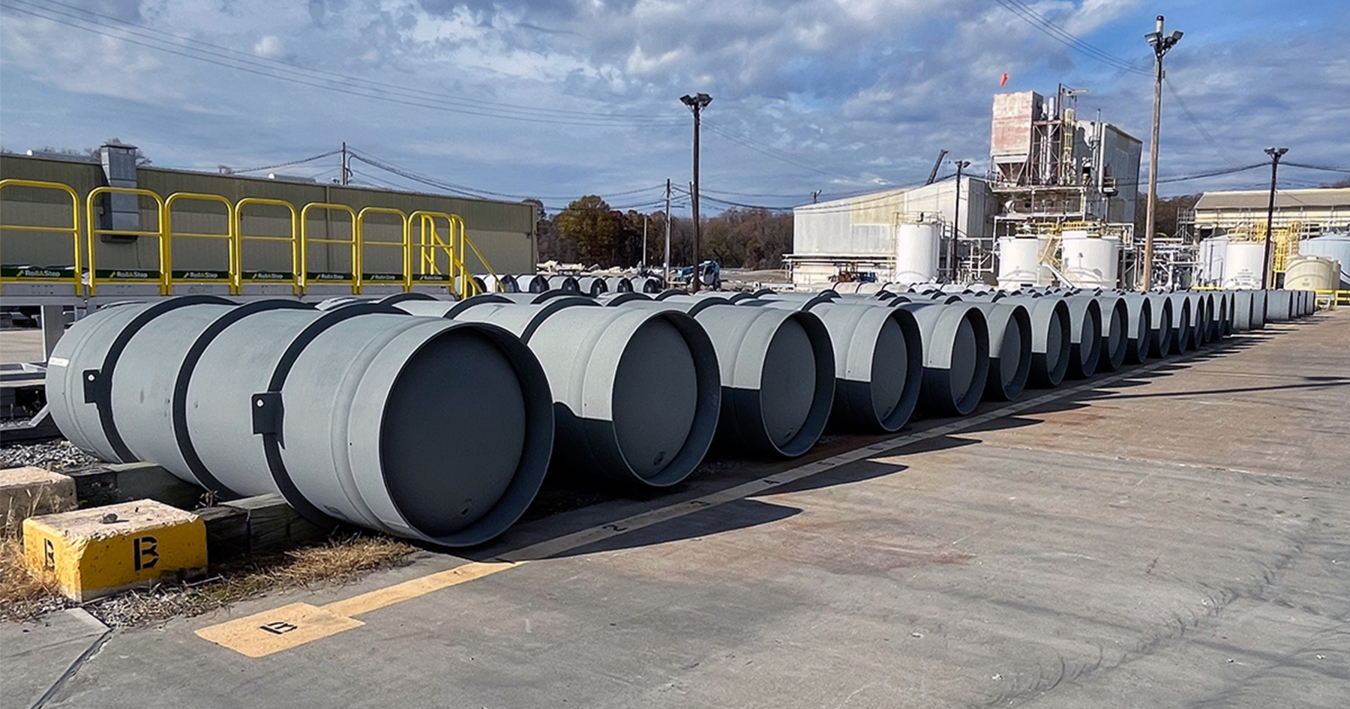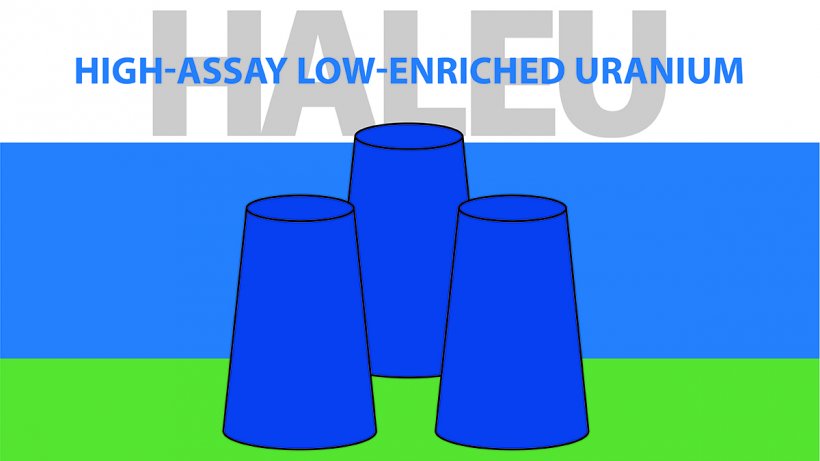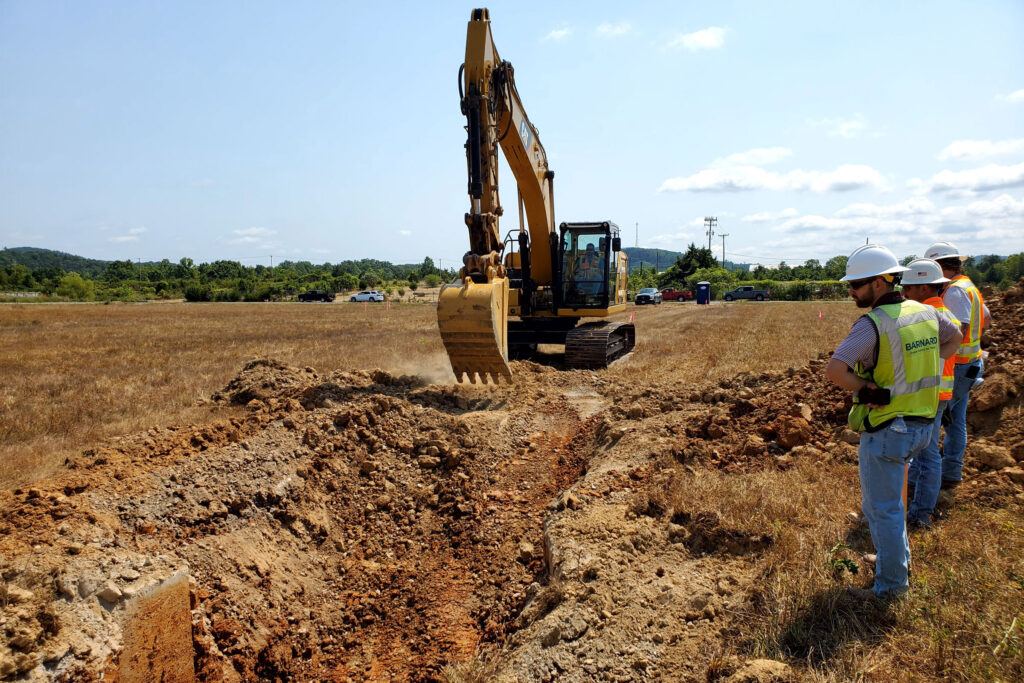At NRC headquarters are (from left) UUSA’s Gerard Poortman, Wyatt Padgett, Lisa Hardison, and Paul Lorskulsint (seated), with the NRC’s James Downs (seated), Shana Helton, Kimyata Morgan-Butler, John Lubinski, and Johnathan Rowley. (Photo: Urenco USA)
Just one day after Urenco USA (UUSA) was picked by the Department of Energy as one of six contractors eligible to compete for future low-enriched uranium task orders, the Nuclear Regulatory Commission on December 11 formally approved the company’s license amendment request to boost uranium enrichment levels at its Eunice, N.M., enrichment facility to 10 percent fissile uranium-235—up from its current limit of 5.5 percent.
Uranium hexafluoride gas containers. (Photo: DOE)
The Department of Energy announced yesterday the six companies that it has selected to supply low-enriched uranium (LEU) from new domestic enrichment sources under future contracts for up to 10 years. The contract recipients are: Centrus Energy’s American Centrifuge Operating, General Matter, Global Laser Enrichment (GLE), Laser Isotope Separation Technologies (LIS Technologies), Orano Federal Services, and Urenco USA’s Louisiana Energy Services.
A subset of the Deimos experiment team. (Photo: LANL)
Los Alamos National Laboratory researchers have performed a critical experiment using high-assay low-enriched uranium (HALEU) TRISO fuel. It is the nation’s first criticality safety experiment using HALEU fuel in more than 20 years. On November 21, LANL announced the work of its Deimos team, which earlier this year carried out an experiment at the National Criticality Experiments Research Center (NCERC), operated by LANL at the Nevada National Security Site.
ANS open letter to Science magazine challenging claims about HALEU
September 3, 2024
Dr. Holden Thorp
Editor-in-Chief, Science
Subject: Science magazine Policy Forum article “The weapons potential of high-assay low-enriched uranium” published June 2024
Dear Dr. Thorp:
The American Nuclear Society—a professional nuclear science and technology society representing more than 10,000 members worldwide—writes this open letter to address concerns regarding Science magazine’s June 2024 Policy Forum article, entitled “The weapons potential of high-assay low-enriched uranium” by R. Scott Kemp, Edwin S. Lyman, Mark R. Deinert, Richard L. Garwin, and Frank N. von Hippel.
The article describes the potential misuse of high-assay low-enriched uranium (HALEU)1. We acknowledge the importance of this discussion and the necessity of continually evaluating the proliferation risks associated with nuclear materials. However, after extensive technical review of the article by members and officers of the ANS Fuel Cycle and Waste Management Division and the ANS Nuclear Nonproliferation Policy Division, we remain unconvinced of the positions advocated by the authors.
ANS open letter scrutinizes hyperbolic unscientific claims about HALEU
Washington, D.C. — In an open letter to Science magazine, the American Nuclear Society (ANS), a professional nuclear science and technology society representing over 10,000 members worldwide, expressed its membership’s skepticism toward claims made in a recent article that advocated high-assay low-enriched uranium (HALEU) fuel should be reclassified by the United States and restricted from commercial use in powering advanced reactor designs. The ANS emphasized the importance of a balanced, science-based discussion, and scrutinized the unscientific and hyperbolic nature of the arguments presented in the article.
“We acknowledge the importance of this discussion and the necessity of continually evaluating the proliferation risks associated with nuclear materials,” wrote ANS President Lisa Marshall in the letter. “However, after extensive technical review of the article by members and officers of the ANS Fuel Cycle and Waste Management Division and the ANS Nuclear Nonproliferation Policy Division, we remain unconvinced of the positions advocated by the authors.”
Urenco’s Capenhurst enrichment site in the U.K. (Photo: Urenco)
A plan to build up a high-assay low-enriched uranium fuel cycle in the United Kingdom to support the deployment of advanced reactors is still in place after the Labour party was voted to power on July 4, bringing 14 years of conservative government to an end. A competitive solicitation for grant funding to build a commercial-scale HALEU deconversion facility opened days before the election, and the support of the new government was confirmed by a set of updates on July 19. But what does the U.K. HALEU program entail, and how does it differ from the U.S. HALEU Availability Program?
Workers begin construction at the Hermes site in Oak Ridge, Tenn. (Photo: Kairos Power)
Earlier today, on a site in Oak Ridge, Tenn., that was formerly home to the K-33 Gaseous Diffusion Plant, Kairos Power marked the start of construction on its low-power demonstration reactor. Named Hermes, the 35-MWt test reactor claims status as the first Gen IV reactor to be approved for construction by the Nuclear Regulatory Commission and the first non–light water reactor to be permitted in the United States in more than 50 years.
Statement from the American Nuclear Society on the G7 communiqué.
June 20, 2024, 1:19PMEdited June 20, 2024, 1:31PMUpdated June 20, 2024, 1:29PMPress Releases Las Vegas, Nev. — The American Nuclear Society (ANS) issued the following statement during the 2024 ANS Annual Conference in Las Vegas:
“The American Nuclear Society applauds the Group of Seven (G7) leaders’ Apulia communiqué in its call for continued international cooperation in strengthening, expanding, and diversifying civil nuclear supply chains as the world deploys advanced reactors.








